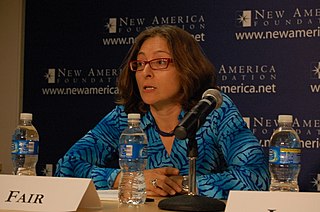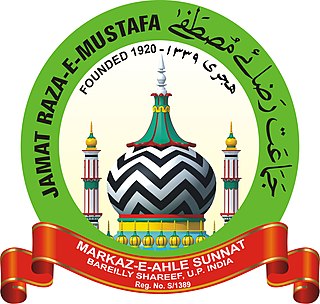
The Society of the Muslim Brothers, better known as the Muslim Brotherhood, is a transnational Sunni Islamist organization founded in Egypt by Islamic scholar and schoolteacher Hassan al-Banna in 1928. Al-Banna's teachings spread far beyond Egypt, influencing today various Islamist movements from charitable organizations to political parties.

Wahhabism is a reformist Islamic religious movement within Sunni Islam, based on the teachings of 18th century Hanbali cleric Muhammad ibn 'Abd al-Wahhab. The term "Wahhabism" is primarily an exonym ; it was not used by Ibn 'Abd al-Wahhab himself or adherents to the movement, who typically prefer to be called "Salafi". The movement's early followers referred to themselves as Muwahhidun derived from the term Tawhid. The term "Wahhabi" has also been deployed by various outsiders as a sectarian and Islamophobic slur.

The Salafi movement or Salafism is a revival movement within Sunni Islam, which was formed as a socio-religious resistance to European imperialism during the late 19th century and has remained influential in the Islamic World for over a century. The name "Salafiyya" refers to advocacy of a return to the traditions of the "pious predecessors", the first three generations of Muslims, who are believed to exemplify the pure form of Islam. In practice, Salafis maintain that Muslims ought to rely on the Qur'an, the Sunnah and the 'Ijma (consensus) of the salaf, giving these writings precedence over later religious interpretations. The Salafi movement aimed to achieve a renewal of Muslim life and had a major influence on many Muslim thinkers and movements across the Islamic world.

The Barelvi movement, also known as Ahl al-Sunnah wa'l-Jamaah is a Sunni revivalist movement following the Hanafi and Shafi'i schools of jurisprudence, and Maturidi and Ashʿari schools of theology with strong Sufi influences and with hundreds of millions of followers. It is a broad Sufi-oriented movement that encompasses a variety of Sufi orders, including the Chistis, Qadiris, Soharwardis and Naqshbandis as well as many other orders and sub-orders of Sufism. They consider themselves to be the continuation of Sunni Islamic orthodoxy before the rise of Salafism and Deobandi Movement.

The Islamic Center of Washington is a mosque and Islamic cultural center in Washington, D.C. It is located on Embassy Row on Massachusetts Avenue just east of the bridge over Rock Creek. When it opened in 1957, it was the largest mosque in the Western Hemisphere.

Mehdi Raza Hasan is a British-American broadcaster and author. He presented The Mehdi Hasan Show on Peacock since October 2020 and on MSNBC from February 2021 until the show's cancellation in November 2023.
Islamic feminism is a form of feminism concerned with the role of women in Islam. It aims for the full equality of all Muslims, regardless of gender, in public and private life. Islamic feminists advocate women's rights, gender equality, and social justice grounded in an Islamic framework. Although rooted in Islam, the movement's pioneers have also utilized secular, Western, or otherwise non-Muslim feminist discourses, and have recognized the role of Islamic feminism as part of an integrated global feminist movement.

Asra Quratulain Nomani is an Indian American author. Born in India to Muslim parents, she earned a BA from West Virginia University in liberal arts in 1986 and an MA from the American University in international communications in 1990. She subsequently worked as a correspondent for The Wall Street Journal with her colleague Daniel Pearl in Pakistan post-9/11. Pearl was kidnapped and murdered by Islamist terrorists while following an investigative lead. Nomani later became the co-director of the Pearl Project, a faculty-student investigative-reporting project which has looked into Pearl's murder.

Islamic extremism, Islamist extremism or radical Islam refers a set of extremist beliefs, behaviors and ideology within Islam. These terms remain contentious, encompassing a spectrum of definitions, ranging from academic interpretations to the notion that all ideologies other than Islam have failed and are inferior. Furthermore, these terms may extend to encompass other sects of Islam that do not share such extremist views.

Asma Afsaruddin is an American scholar of Islamic studies and Professor in the Department of Near Eastern Languages and Cultures at Indiana University in Bloomington.

Salafi jihadism, also known as revolutionary Salafism or jihadist Salafism, is a religious-political Sunni Islamist ideology, seeking to establish a global caliphate, characterized by the advocacy of "physical" (military) jihadist attacks on non-Muslim and (takfired) Muslim targets, and the Salafist interpretation of sacred Islamic texts, which they believe to be "in their most literal, traditional sense", to bring about the return to "true Islam".
Muhammad Saalih Al-Munajjid is a Syrian-born Palestinian-Saudi Islamic scholar. He is the founder of the fatwa website IslamQA, a popular website for responses on the topic of Islam.

Carol Christine Fair is an American political scientist. She is an associate professor in the Security Studies Program within the Edmund A. Walsh School of Foreign Service at Georgetown University. Her work is primarily focused on counter-terrorism and South Asian topics.
The use of politically and religiously-motivated violence dates back to the early history of Islam, its origins are found in the behavior, sayings, and rulings of the Islamic prophet Muhammad, his companions, and the first caliphs in the 7th, 8th, and 9th centuries CE. Mainstream Islamic law stipulates detailed regulations for the use of violence, including corporal and capital punishment, as well as regulations on how, when, and whom to wage war against.

The Yemeni Congregation for Reform, frequently called al-Islah, is a Yemeni Sunni Islamist movement established in 1990 by Abdullah ibn Husayn al-Ahmar, Ali Mohsen al-Ahmar, Abdul Majeed al-Zindani, with Ali Saleh's blessing. The first article of Islah basic law defines it as "a popular political organization that seeks reform of all aspects of life on the basis of Islamic principles and teachings".
The Aligarh Movement was the push to establish a modern system of Western-style scientific education for the Muslim population of British India, during the later decades of the 19th century. The movement's name derives from the fact that its core and origins lay in the city of Aligarh in Central India and, in particular, with the foundation of the Muhammadan Anglo-Oriental College in 1875. The founder of the oriental college, and the other educational institutions that developed from it, was Sir Syed Ahmed Khan. He became the leading light of the wider Aligarh Movement.
Moderate Islam and moderate Muslim are labels that are used within counterterrorism discourse as the complement of "Islamic extremism" and imply that supporting Islamic terrorism is the characteristic of a "radical" faction within Islam, and a "moderate" faction of Muslims denounces extremist violence such as Islamic terrorism, militant jihadism and radical Islamism.
This is a list of individual liberal and progressive Islamic movements in Europe, sorted by country. See also Islam in Europe and Euroislam.
This is a list of individual liberal and progressive Islamic movements in North America, sorted by country.

Jamat Raza-e-Mustafa also known as JRM, is a historical organisation of Indian Sunni Barelvi Muslims associated with Sufism. It was founded by scholar and 19th-century Mujadid Ahmed Raza Khan Barelvi on 17 December 1920 in Bareilly, India, to propagate Islamic teachings in accordance with Ahle Sunnah wal Jama'ah. The self-described aim of the group is to "deny misguided sects and safeguard the beliefs (Aqaa'id) of the Ahle Sunnah wal Jama'ah."











